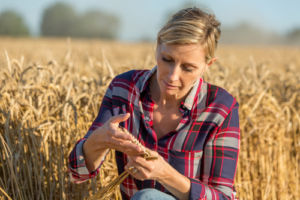What should you consider when inheriting a farm? Lorna Sixsmith, author of ‘Would you marry a farmer?’, gives some sound advice.
Congratulations, you’re inheriting the family farm. The farm isn’t just a financial asset. It will provide you with a business, a home, a wonderful lifestyle and a sense of history as you become the next generation to farm the land you love. The process isn’t always smooth but will be easier if you consider these issues first.
Your age
While it’s never too late to run your own business, do recognise what is achievable within a given time scale. While farmers are viewed as being asset-rich, very few sell the land. They see themselves as being a custodian of the family farm with the responsibility of improving it before handing it on to the next generation – this takes time. If you can, allow at least three decades to plan, build, improve, pay off loans, and still have a chance to enjoy the fruits of your labours before handing it on.
Enjoyment
Farmers have to work hard for their income so choose a type of farming that suits your land and your lifestyle. You don’t have to do it the way it has always been done. One of the highlights of being self-employed is setting challenges, celebrating each one as it is achieved before moving on to the next. It’s often the journey that is as enjoyable as reaching the goal.
DOWNLOAD: A free farm cash flow planner.
Income and expenditure
The cost of transferring the farm will be significant. Be realistic about your future revenues and expenses. Having a forthright chat with a good accountant will help you make decisions about your future. Is there enough income for you to farm full-time? If you are working in a full-time job off-farm, how will you include farming into your day when you have young children? If your spouse is working full-time too, how will you share the housework and the childcare?
“If you are working in a full-time job off-farm, how will you include farming into your day when you have young children?”
Your parents’ retirement
It’s important to discuss your parents’ retirement plans with them. Will they continue to work on the farm? Their knowledge and assistance will be useful, but safety issues become more important as they get older. Will their pension provide for them or will you be assisting them financially? Paying for expenses such as their health insurance, household bills or fuel might be all right for a while. However, do recognise these bills will eat a bigger hole in your income when you have farm improvement loans, children, and a mortgage. Your spouse might just start to wonder if they are going to live forever.
Living accommodation
If you’re not in a relationship, it probably makes sense to share the farmhouse with your parents. If you are, remember choices about living accommodation can affect your relationships.
If you move into the farmhouse and build your parents a bungalow, your mother may love her new kitchen, but she might continue to make comments on any changes to the farmhouse. It’s unlikely these will be appreciated by you or your partner.
“Farming practices often have to change to be profitable so seek the advice of agricultural advisors, your accountant and your bank manager when planning your future.”
If they stay in the farmhouse and your home is half a mile away, it can make it more difficult for your partner and children to get involved in the farm. The distance could reduce the time you spend with your kids.
If the farmhouse is large, does it seem to make more sense to extend and divide it? This would save money and provide the older couple with more security but means privacy could be in short supply. Life can be very rosy until you all get tetchy from living in each other’s pockets.
Farming with family without killing each other
When the Early Retirement Scheme was introduced in 2007, it was intended to encourage the transfer of farms from parents to adult children. Perhaps it also recognised the attitude “you can do what you want as long as you don’t change anything” curtailed progress as one condition insisted the older farmer couldn’t work on the farm. Your dad might still offer an opinion on everything from asking “what do you need that for?” to saying “that one paid a lot of bills” when you mention that you’re thinking of culling one of his favourite cows. Seek his knowledge and expertise but remember, you’re the one paying the bills so don’t be afraid to make firm decisions. Farming practices often have to change to be profitable so seek the advice of agricultural advisors, your accountant and your bank manager when planning your future.
It can be a beautiful life
Plan and enjoy. Even on the bad days (and there will be some), appreciate your environment. There aren’t many careers that provide your very own meandering lanes, grassy hills, shady glades, flowing streams, beautiful views, and hedges full of autumnal forage.
Lorna Sixsmith is an author and is also married to a farmer. Her books include: ‘How to be the perfect farm wife’; ‘Would you marry a farmer?’; and ‘An ideal farm husband’. Follow Lorna on Twitter @IrishFarmerette.
This post was originally published here - https://www.thinkbusiness.ie/articles/inheriting-a-farm-lorna-sixsmith/ on





